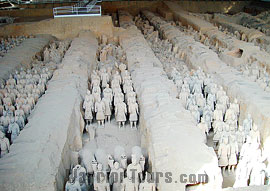Qin Dynasty (221 BC - 206 BC)
 Originally, the Qin people were an ancient tribe in western China. During the rule of King Xiao of the Zhou Dynasty (11 century BC - 221 BC), Feizi, chief of the Qin tribe, raised horses for the king who then gave Feizi the surname of Ying. Later, Duke Zhuang, another chief of the Qin tribe, received orders from King Xuan to fight against the Quanrong who were badly defeated during the war. Thereafter, the Qin tribe gradually grew more powerful. In the later times of the Western Zhou Dynasty (11th century BC - 771 BC), Duke Xiang of the Qin tribe was conferred as a vassal along with the land of Qixi (Baoji City, Shaanxi Province today) by King Ping, because he had made contributions to escort King Ping to move east. In the Spring and Autumn Periods, Duke De of the Qin State moved the capital to Yong (Fengxiang County, Shaanxi Province today). In the Warring States Periods, Duke Xiao appointed Shang Yang to carry out a series of political reforms to strengthen the state, which laid a solid foundation for the feudal economy and politics of the Qin State. Since then, the Qin State gradually became stronger and stronger. In the end, Qin destroyed the other six strong states - Han, Zhao, Wei, Yan, Chu and Qi, unified China, and established the first centralized, unified, multi-ethnic feudal state in Chinese history - the Qin Dynasty.
Originally, the Qin people were an ancient tribe in western China. During the rule of King Xiao of the Zhou Dynasty (11 century BC - 221 BC), Feizi, chief of the Qin tribe, raised horses for the king who then gave Feizi the surname of Ying. Later, Duke Zhuang, another chief of the Qin tribe, received orders from King Xuan to fight against the Quanrong who were badly defeated during the war. Thereafter, the Qin tribe gradually grew more powerful. In the later times of the Western Zhou Dynasty (11th century BC - 771 BC), Duke Xiang of the Qin tribe was conferred as a vassal along with the land of Qixi (Baoji City, Shaanxi Province today) by King Ping, because he had made contributions to escort King Ping to move east. In the Spring and Autumn Periods, Duke De of the Qin State moved the capital to Yong (Fengxiang County, Shaanxi Province today). In the Warring States Periods, Duke Xiao appointed Shang Yang to carry out a series of political reforms to strengthen the state, which laid a solid foundation for the feudal economy and politics of the Qin State. Since then, the Qin State gradually became stronger and stronger. In the end, Qin destroyed the other six strong states - Han, Zhao, Wei, Yan, Chu and Qi, unified China, and established the first centralized, unified, multi-ethnic feudal state in Chinese history - the Qin Dynasty.
In 221 BC, King Zheng of the Qin State renamed himself as emperor, and made Xianyang City of Shaanxi Province as the capital. He announced that he was the first emperor of China, and the later generations should inherit the respectful title from him. That is, they should name themselves the second Qin Emperor, the third Qin Emperor and so on. At the same time, he stipulated that the emperor should name himself 'Zhen', and he made a set of court rituals and a records management system to strengthen the emperor's dignity and to control the conduct and power of the ministers. In addition, the first Qin Emperor adopted a series of measures in politics, economy and culture to consolidate his sovereign and to let his family's rule over China last forever.
In politics, Qin Shi Huang centralized all the political, economical and military power in his hands to make sure that his power was supreme. In the central government, he set up the Prime Minister, Yushi Dafu (Supreme Censor) and Taiwei (Commander in Chief). In the local government, he carried out the system of prefectures and counties whereby the country was divided into 36 prefectures, under which counties were established. By doing so, Qin Shi Huang grasped nearly all the power of the country in his own hands.
Economically, the first Qin Emperor standardized the length, measures and weights, and unified the currency, which promoted the economical communications between different ethnic groups, and conveniently provided opportunities for socio-economic development.
Culturally, he unified the characters by making the mini-seal scripts as the official ones, which promoted cultural communications. However, in order to reinforce control over the people's ideas, he ordered the burning of all historical books, literary works and poems collected by the Chinese people, only leaving medical books, books of auguring, crops books, and the books about the Qin State. Furthermore, Qin Shi Huang buried 460 men of letters alive, because some shamans and scholars had secret discussions about his absolutism, covetousness of power, and excessive punishment. That is the well-known event – 'Burn the books and bury the scholars alive'.
In addition, to further strengthen and glorify the emperor's power, Qin Shi Huang formulated a set of complicated rituals for libations and worship. He also requisitioned thousands of common people to construct many palaces around Xianyang for him, among which the Epang Palace was the most luxurious. At the same time, Qin Shi Huang believed that when a person died, his spirit would go to the heaven and still exist. So he had constructed his tomb on the Li Mountain when he was still alive in the hope that he could continue his sovereign after the death. In the tomb, it was built with heaven and earth and with mercury as the rivers and seas. What's more, not far from the tomb, he constructed his huge underground army, which is the noted eighth wonder of the world - Museum of Qin Terra-cotta Warriors and Horses.
The unification of the Qin State ended the long-term separations and local divisions in China and it made Chinese people live a peaceful and steady life to some extent. However, Qin's tyranny, heavy hard labor, endless military service and taxes, and rude punishments brought people great disasters and suffering. Especially in the rule of the Second Qin Emperor, people's lives were filled with untold suffering. Finally, Chen Sheng and Wu Guang launched a peasant uprising, which brought about the downfall of the Qin Dynasty, although they failed in the end.
Following them, Xiang Yu and Liu Bang's uprising finally overthrew the tyranny of the Qin Dynasty.

